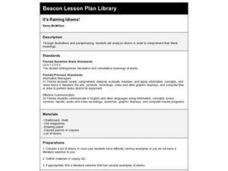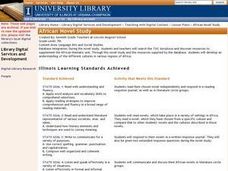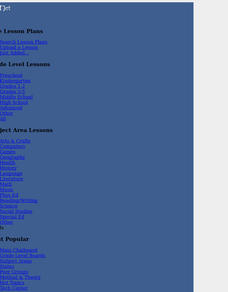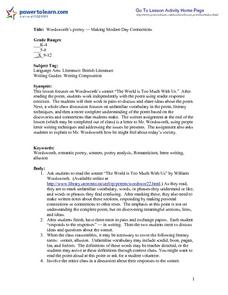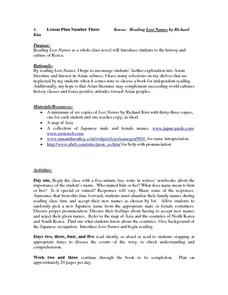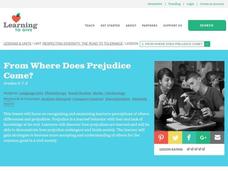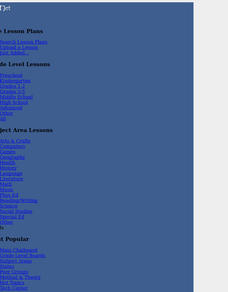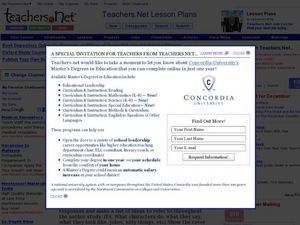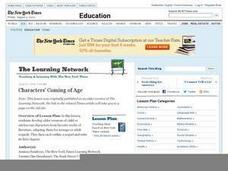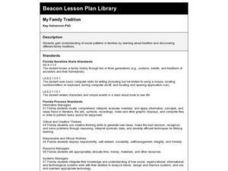Curated OER
"In a Grove" and "Rashomon" by Akutagawa
Students read and analyze the short stories, "In a Grove," and "Rashomon," by Akutagawa. They discuss the samurai warrior culture, watch a short video, take a quiz, participate in whole-group discussions, identify similes and metaphors,...
Curated OER
Iconography: Art and Literature
Learners discover the main subjects and objects of Buddhist art and how symbolism in the Arts can enhance the artistic elements. The lesson concludes with the creation of student works using iconography.
Curated OER
The Individual and His Role in Society
Tenth graders discover how various writers approach the themes of : alienation and solitude, living life "deliberately" and "phonies." Through reading, journaling, class discussion, and writing assignments they realize the power of the...
Curated OER
It's Raining Idioms!
Sixth graders analyze idioms and find examples from literature. They choose one idiom and finds pictures or draws pictures to show what it would mean if taken literally and what is it generally thought to mean.
Curated OER
African Novel Study
Seventh graders participate in literature circles as they read African novels. They read, work on word studies, and complete comprehension activities. They share their reading with other literature circle groups in the class.
Curated OER
Sonnets
Young scholars examine the structure of sonnets. They compare and contrast them with modern day poetry. They write their own sonnet after changing the language in another sonnet to see why the author choosed certain words.
Curated OER
Finding Self-Reliance
Fourth graders relate what is read to their own experiences and feelings and use active listening to respond to other students' comments. After a lecture/demo, 4th graders utilize an Active Listening Chart imbedded in this plan to gain...
Curated OER
Wordsworth's Poetry
High schoolers read Wordsworth sonnet, "The World is Too Much With Us," and complete reader response criticsm worksheets. They examine the poet's ideas and techniques then write a letter to Mr. Wordsworth and explain how he might feel...
Curated OER
Story Parts
Third graders identify the three major parts of a story. After reading the book "Stellaluna," students discuss the beginning, middle and end of the story. They write a short story depicting the events that would happen if the story...
Curated OER
"Julie of the Wolves"
Fifth graders research life in Alaska and compare life there to their lives in this lesson. They read "Julie of the Wolves." They research through the novel and other reference books facts about the Alaskan climate and geography. They...
Curated OER
The Vikings
Students research and explore Viking culture, distinguishing between fact and fiction, and examine their contribution to our society.
Curated OER
Korea: Reading Lost Names by Richard Kim
Students explore the history and culture of Korea. They randomly pick a new name from appropriate male or female containers. They discuss proper pronunciation and their feelings about having to accept new names.
Curated OER
From Where Does Prejudice Come?
Learners explore the concept of discrimination. In this social studies lesson, students view pictures and write down the first thing that comes to their mind. Learners discuss if stereotyping or prejudice affected their first...
Curated OER
Hats
Students listen to a read aloud of "Hats, hats, hats," by Ann Morris focusing on the variety of hats. They play a file folder game categorizing hats from the book.
Curated OER
Oedipus Wrecks
Students explore the concept of the 'tragic hero' and how such characters are relevant in theatre, literature, and history.
Curated OER
Analyzing Huck Finn: A Cooperative Learning Lesson
Students answer questions from "Huckleberry Finn" in groups. They use the internet or other sources to help them in their answer. They share their responses with the class and discuss.
Curated OER
Female Poets Speak For Themselves
Student examine selected works of twentieth-century female poets that speak to the stereotypes about women inherent in Western culture. Individually, students explore these stereotypes and their experience with them. Students create a...
Curated OER
Longfellow Amongst His Contemporaries: the Ship of State Dbq
Students evaluate the ship of state metaphor in relation to the historical events in America from the Revolutionary War to the Civil War. They synthesize ideas presented in ten different primary source documents and compose an essay...
Curated OER
Buddy, Are You Ready?-Preparing for School Emergencies
Students explore natural disasters by reading stories about volcanoes, earthquakes, floods, and hurricanes. They explore safe behaviors in order to understand what to expect in a catastrophe. Students practice safe evacuation procedures...
Curated OER
Robert Munsch: Author Study
Students study Robert Munsch's style of writing. In this literature lesson, students read many of Robert Munsch's books, write a list of the characteristics found in his books, and write or orally tell a story using...
Curated OER
The Dust Bowl
Eleventh graders develop an understanding of the Dust Bowl. In this 1930's America lesson, 11th graders respond to questions regarding the songs and literature about the era. The primary sources should be gathered by the instructor.
Curated OER
Author's Purpose
Middle schoolers identify the key components to determining the author's purpose in literature. They read a short selection and answer four key questions. Student chart the responses. They discuss the responses and identify the author's...
Curated OER
Characters' Coming of Age
Students develop older versions of child or adolescent characters from favorite works of literature, adapting them for teenage or adult sequels. They each outline a sequel and write its first chapter.
Curated OER
My Family Tradition
Students examine different family traditions to further explain social patterns. They complete a graphic organizer using educational software.





